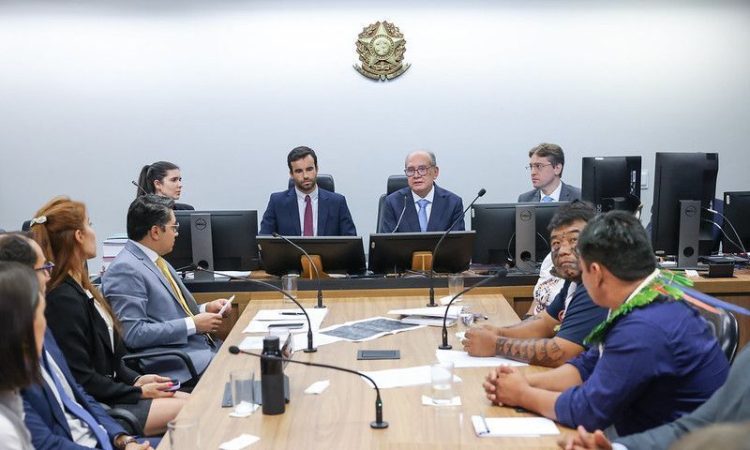
Ministers of the Federal Supreme Court (STF) defend the adoption of negotiation and conciliation methods for disputes involving conflicts over land in the countryside between farmers and indigenous peoples.
Speeches in support of the resolution format were made by Gilmar Mendes, Alexandre de Moraes, Flávio Dino and Luís Roberto Barroso at the opening of this Thursday’s plenary session (26).
The night before, the STF reached a decision to resolve the land conflict involving the demarcation of the Ñande Ru Marangatu Indigenous Land, in Mato Grosso do Sul.
The process was led by Minister Gilmar Mendes’ office. The dispute has been going on since 2005. In recent weeks, there has been an escalation of violence with gunshot attacks. At least two indigenous people were killed.
For Gilmar, the model adopted to resolve the case was “extremely relevant”. “Maybe it’s institutional learning to model other conflicting or conflicting areas that we have,” he said.
The minister said that a “Herculean work” was done to reach a conciliation and that there was “constructive work” on the part of the federal government.
“(There was constructive work by the government) based on guidance from the President of the Republic himself, Lula, who, even during this interval, in New York, participated, connected and engaged directly in this process”.
“Historic agreement”
Alexandre de Moraes praised Gilmar’s initiative in making the agreement possible, and said that the step taken was “historic”.
“The indigenous issue is extremely sensitive,” he stated. “If there is no consensus, agreement, especially Mato Grosso and Mato Grosso do Sul, where there are several lands that were given back there by Dom Pedro, if there is no compensation, if there is no idea of a solution on all sides, we will really be left decades with this problem.”
According to Moraes, the experience of the concluded agreement will enable indigenous people and farmers to realize that “it is possible to sit around a table and reach an agreement for the good of everyone and the good of the country”.
Flávio Dino and the president of the Court, Luís Roberto Barroso, followed the same line.
The first called the agreement on indigenous land a “conquest”.
“This achievement shows, in addition to the virtues in themselves, perhaps a successful model in which conciliation is part of the list of possible solutions in terms of fundamental rights and we have this dialectical exercise of building a good relationship with the parties and with society. exit,” he declared.
The president of the STF praised Gilmar’s initiative and defended the possibility of resolving disputes through dialogue.
“There is a somewhat misperception that law and litigation are the same thing. And a critical perception of the Judiciary’s actions to avoid litigation or resolve disputes,” he stated. “And our role is to solve problems, not necessarily decide disputes.”
Marco temporal
According to Gilmar, the agreement on the Ñande Ru Marangatu territory brings points from the STF’s understanding in relation to the time frame for the demarcation of indigenous lands.
In the case of the territory in question, farmers who are in the area (which has already been decreed as permanent indigenous possession) will receive R$130 million from the Union as compensation for the value of the land itself and the improvements made to the location.
The state of Mato Grosso do Sul will also pay the owners another R$16 million.
The possibility of compensation for the value of the land, called “bare land”, was in the thesis in which the time frame was declared unconstitutional, in September 2023.
Even with the Court’s decision, the time frame became law by decision of Congress. The thesis that establishes that indigenous people only have the right to the lands they occupied or disputed on the day the Constitution was promulgated (October 5, 1988) has been in force since December.
Disagreement
Despite public speeches in defense of the model, there is not full agreement among indigenous communities on the conditions under which negotiations are carried out.
At the end of August, for example, the Articulation of Indigenous Peoples of Brazil (Apib) created in the STF to discuss actions against the time frame law
At the time, one of the main factors cited by the entity was the fact that this law remained in force during the period of negotiations – a situation of “negotiating inequality”.
According to the entity, there were no guarantees of sufficient protection for indigenous people and of a possible agreement that would protect the autonomy of original peoples.

